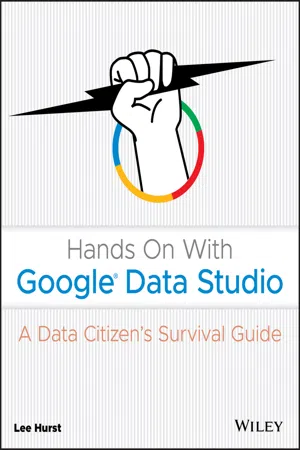
- English
- ePUB (mobile friendly)
- Available on iOS & Android
About this book
Learn how to easily transform your data into engaging, interactive visual reports!
Data is no longer the sole domain of tech professionals and scientists. Whether in our personal, business, or community lives, data is rapidly increasing in both importance and sheer volume. The ability to visualize all kinds of data is now within reach for anyone with a computer and an internet connection. Google Data Studio, quickly becoming the most popular free tool in data visualization, offers users a flexible, powerful way to transform private and public data into interactive knowledge that can be easily shared and understood. Hands On With Google Data Studio teaches you how to visualize your data today and produce professional quality results quickly and easily.
No previous experience is required to get started right away—all you need is this guide, a Gmail account, and a little curiosity to access and visualize data just like large businesses and organizations. Clear, step-by-step instructions help you identify business trends, turn budget data into a report, assess how your websites or business listings are performing, analyze public data, and much more. Practical examples and expert tips are found throughout the text to help you fully understand and apply your new knowledge to a wide array of real-world scenarios. This engaging, reader-friendly guide will enable you to:
- Use Google Data Studio to access various types of data, from your own personal data to public sources
- Build your first data set, navigate the Data Studio interface, customize reports, and share your work
- Learn the fundamentals of data visualization, personal data accessibility, and open data API's
- Harness the power of publicly accessible data services including Google's recently released Data Set Search
- Add banners, logos, custom graphics, and color palettes
Hands On With Google Data Studio: A Data Citizens Survival Guide is a must-have resource for anyone starting their data visualization journey, from individuals, consultants, and small business owners to large business and organization managers and leaders.
Frequently asked questions
- Essential is ideal for learners and professionals who enjoy exploring a wide range of subjects. Access the Essential Library with 800,000+ trusted titles and best-sellers across business, personal growth, and the humanities. Includes unlimited reading time and Standard Read Aloud voice.
- Complete: Perfect for advanced learners and researchers needing full, unrestricted access. Unlock 1.4M+ books across hundreds of subjects, including academic and specialized titles. The Complete Plan also includes advanced features like Premium Read Aloud and Research Assistant.
Please note we cannot support devices running on iOS 13 and Android 7 or earlier. Learn more about using the app.
Information
Part I
Data Studio Basics
In This Part
- Chapter 1: Data Studio and the Data Citizen
- Chapter 2: Cooking with Google Data Studio
- Chapter 3: Enhancing Basic Graphs
- Chapter 4: Data Exploration with Interactive Elements
CHAPTER 1
Data Studio and the Data Citizen
- Has access to data in a format that can be analyzed
- Has access to the tools for data analysis
- Has a personal, business, or community interest in building their data literacy and skills
- Has some interest in deriving value from data to benefit themselves personally, their business, or their community
Data, Data Everywhere
Accessibility of Data
Deriving Value from Data
Table of contents
- Cover
- Table of Contents
- Introduction
- Part I: Data Studio Basics
- Part II: Business and Marketing Applications
- Part III: Beyond the Office
- Index
- End User License Agreement